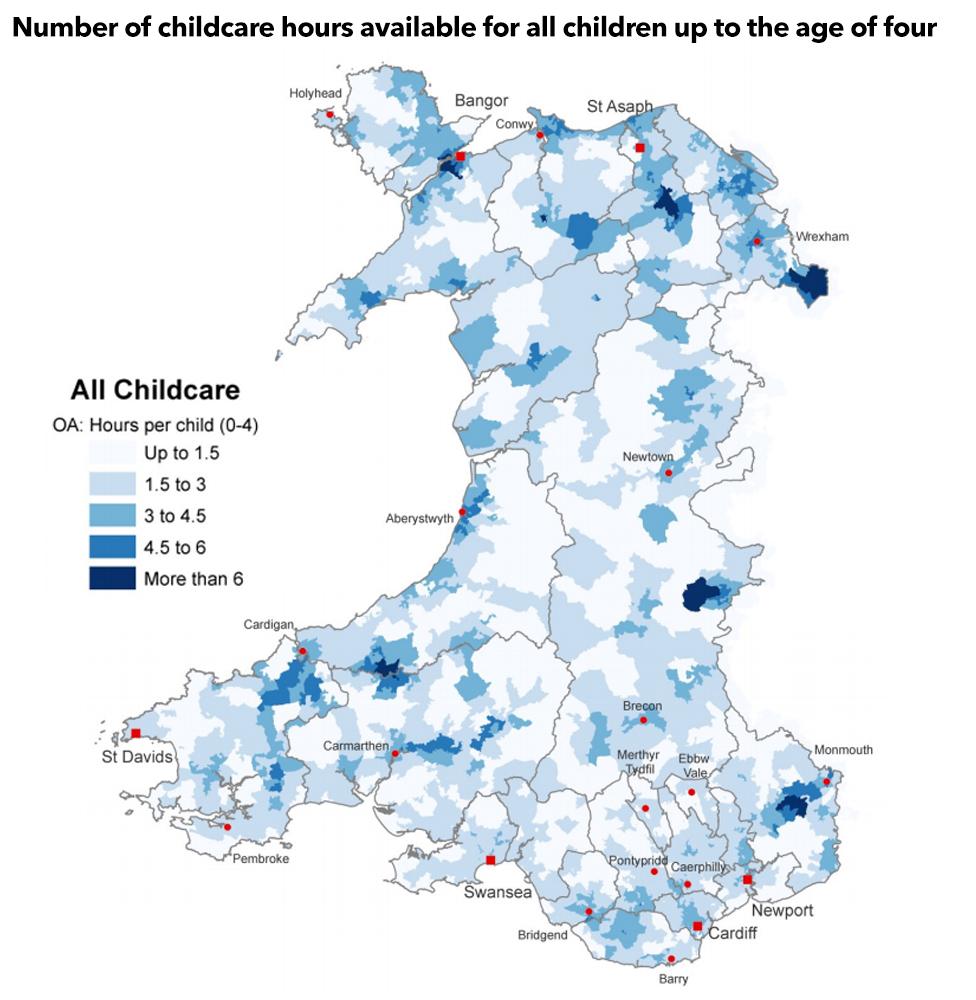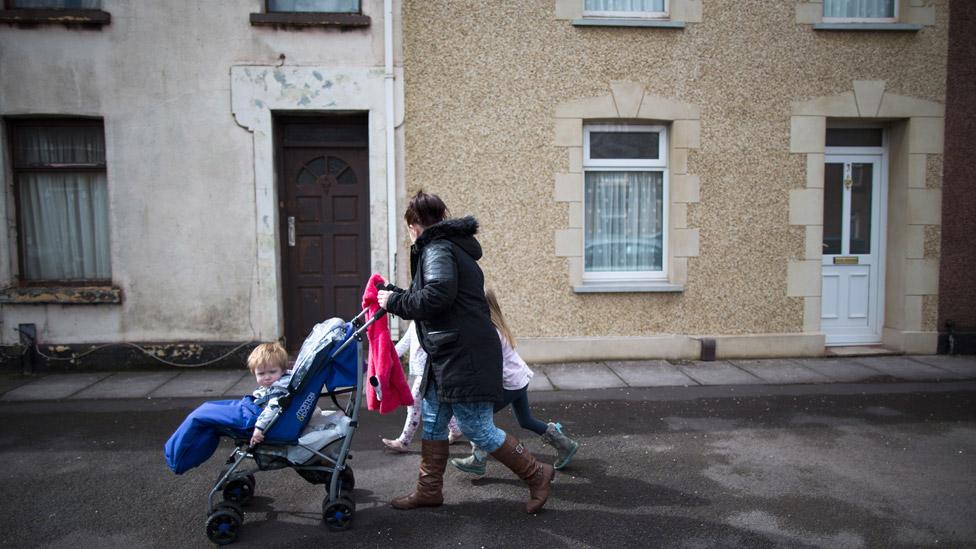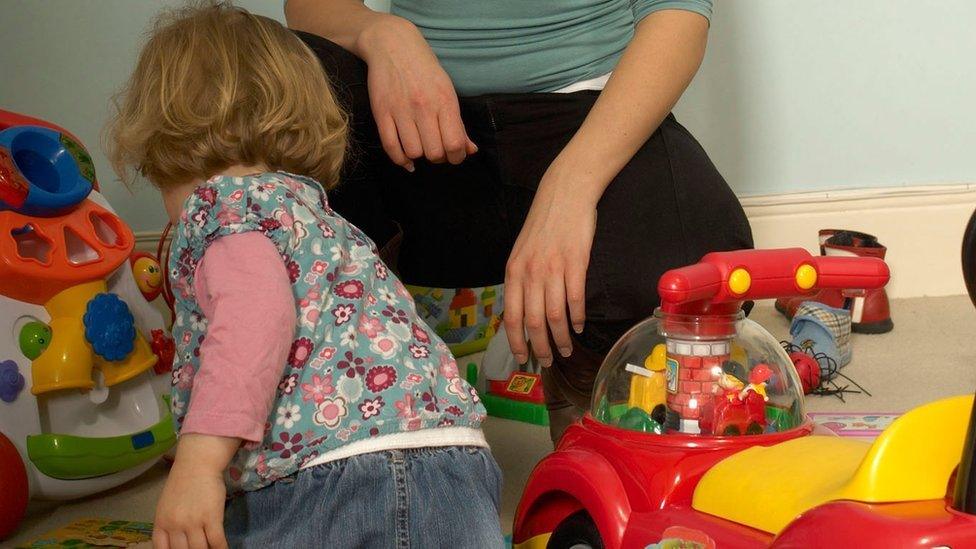Concerns over lack of childcare places to meet Welsh pledge
- Published
Wendy Powell, who runs a nursery in Flintshire, said there were challenges to overcome if the pledge is to be a success
A lack of nursery places means some parents will not be able to access a Welsh Government promise of 30 hours of free childcare, a report has warned.
On average two hours and 40 minutes of care is available per child, with some areas having no availability.
The Welsh Government has pledged 30 free hours a week for three and four-year-olds with working parents. It said it was working to address capacity.
Parents said they already struggled to find affordable and flexible childcare.
The pledge, which covers 48 weeks of the year, aims to remove one of the "major barriers to employment".
Currently, all three to four year olds are entitled to a minimum of 10 hours per week of free childcare during term time.
But a Welsh Government-commissioned report, external has highlighted issues with levels of childcare availability.
Analysis in the report shows the average Wales-wide availability is two hours and 40 minutes per child, with the best access areas offering "little more than six hours" and some areas having no childcare availability at all.
Since September, the free childcare offer has been piloted in six areas - Rhondda Cynon Taff, Swansea, Blaenau Gwent, Caerphilly, Flintshire, Anglesey and Gwynedd.


CASE STUDY
Single mother-of-four Zoe Maidment, whose youngest child is aged four, has struggled to find work that fits around childcare.
She recently completed a work placement set up between a retailer and Gingerbread Wales, a charity for single-parent families, and was offered a job.
But Miss Maidment, from Fairwater in Cardiff, was not able to accept it as she could not find childcare available at suitable times.
"The childcare situation is very stressful and upsetting," she said.
"There is this expectation for single mums and dads to work but it's not always that easy if you don't have the support network of family and friends.
"I think a lot of single parents do want to work, to feel like they're supporting their family. Thirty hours of free childcare would be helpful, but only as long as they can facilitate it."


According to the report, there are 70,000 children aged three and four in Wales.
It said if all eligible children took up the offer, it would mean more than 46,000 full-time places would be required - but there are estimated to be just 45,000.
"This means, at current estimates, if all full-time places were devoted to providing the childcare offer, there still would not be enough places," the report said.
It highlighted that childcare availability was higher in north Wales, where there are more affluent areas and a lower density of people.
But the report also revealed some rural areas and disadvantaged areas have no or limited childcare availability.
Amy Preece, head of Gingerbread Wales, said parents of young children want to work but "affordable and flexible childcare is not always available".
"We welcome the principle of increasing the hours of free childcare for parents of three and four-year-olds in Wales and recommend that this is also extended to ensure those in education and training and part-time work are eligible," she said.
"But as the research shows, the policy will not work in practice without investment. Until free, high-quality childcare is available across Wales, single parents will continue to struggle to enter employment."


The Wendy House Nursery is one of the nurseries taking part in the pilot in Flintshire
Owner Wendy Powell said nurseries are facing increasing costs and believes a cut in business rates would help.
"We are very happy about the offer because it will help parents but we are being forced to put our fees up all the time," she said.
"It's very expensive at the point of delivery because of all the things required to provide high-quality childcare.
"In the last year or so we have seen so many pressures - my business rates have gone up 40%, we're paying staff the minimum living wage, paying statutory sick pay which then means paying an agency to fill in, ensuring all of our staff are first aid trained.
"We want to do these things to maintain quality but it all costs and many nurseries are struggling."

National Day Nurseries Association (NDNA) Cymru is calling for all private day nurseries in Wales to be exempt from business rates, to enable them to stay afloat and help deliver the initiative.
Scotland recently announced nurseries would be fully exempt from the rates.
Purnima Tanuku, chief executive of NDNA Cymru, said: "This would prevent private nurseries having to pass the additional cost burden onto parents in the form of higher fees for younger children."
A Welsh Government spokeswoman said: "We are under no illusion about the challenge of delivering this commitment, both for the Welsh Government and for providers.
"This is why we are developing the offer very carefully and working very closely with the sector to consider issues such as capacity to ensure we get it right."
- Published9 October 2017

- Published16 October 2016

- Published4 April 2017

- Published13 October 2016

- Published25 August 2016

- Published28 August 2017

- Published20 July 2017
